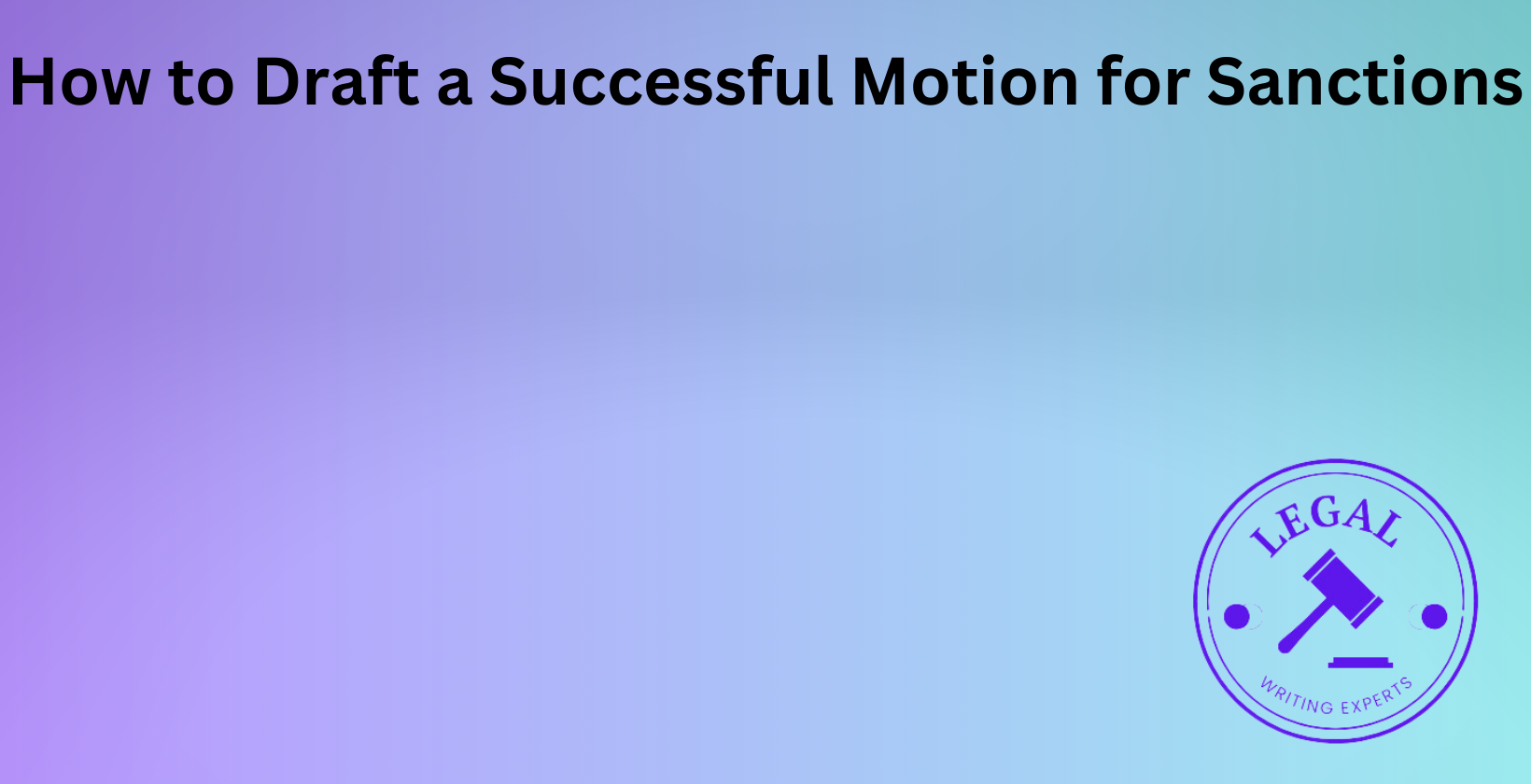How to Draft a Successful Motion for Sanctions
Written by
Jessica E
January 29, 2025 · 8 min read

A motion for sanctions is a legal request to penalize a party for misconduct during the discovery process. Courts impose sanctions to ensure compliance with legal procedures, maintain fairness, and discourage improper behavior. A well-drafted motion for sanctions must clearly outline the violations, present supporting evidence, and demonstrate how the misconduct has prejudiced the requesting party. Understanding the legal standards and procedural requirements for such motions is crucial to increasing the likelihood of a favorable ruling.
What Is a Motion for Sanctions in Discovery Violations?
A motion for sanctions in discovery violations is a formal legal request asking the court to impose penalties on a party that has failed to comply with discovery obligations. Discovery violations occur when a party withholds, destroys, or manipulates evidence that should have been disclosed. Courts use sanctions to address non-compliance, ranging from monetary penalties to adverse inferences or case dismissals.
How to Write a Motion for Sanctions for Discovery Violations?
A motion for sanctions for discovery violations should include a clear statement of the violation, legal grounds for sanctions, and supporting evidence. The document must begin with an introduction summarizing the dispute, followed by a detailed factual background explaining how the opposing party violated discovery rules. Legal arguments must cite applicable rules and precedents supporting the request. The motion should conclude with a specific request for relief, such as fines, evidentiary sanctions, or dismissal of claims.
Where to Hire a Legal Writer to Draft a Motion for Sanctions?
A legal writer to draft a motion for sanctions can be hired from reputable legal writing services or freelance platforms such as Legal Writing Experts. Many law essay writing service providers offer specialized assistance in drafting legal documents. Legal research and writing services ensure that the motion is properly structured, well-argued, and adheres to court requirements.
How to File a Motion for Sanctions for Discovery Violations?
A motion for sanctions for discovery violations must be filed in the appropriate court following local procedural rules. The filing process involves preparing the motion, attaching supporting exhibits, serving copies on the opposing party, and submitting it through the court’s electronic filing system or in person. Courts may require a hearing before ruling on the motion, so scheduling and noticing requirements must be followed precisely.
What Are the Legal Standards for Sanctions in Discovery Violations?
The legal standards for sanctions in discovery violations vary by jurisdiction but generally include willfulness, bad faith, and prejudice. Courts evaluate whether the violating party intentionally withheld or destroyed evidence and whether the misconduct harmed the opposing party’s ability to present its case. Rule 37 of the Federal Rules of Civil Procedure provides guidelines for discovery sanctions, including orders compelling compliance, monetary fines, and case-dismissal remedies.
What Are Common Grounds for Filing a Motion for Sanctions?
The common grounds for filing a motion for sanctions include failure to respond to discovery requests, destruction of evidence, submission of false information, and refusal to comply with court orders. Courts impose sanctions when a party engages in spoliation, improperly redacts information, or fails to produce documents critical to the litigation.
How to Gather Evidence to Support a Motion for Sanctions?
Evidence to support a motion for sanctions can be gathered through discovery responses, deposition transcripts, expert analysis, and communications between parties. Metadata and forensic examinations help establish whether evidence was deleted or altered. Legal teams often use affidavits, expert reports, and court transcripts to strengthen their claims.
What Are the Potential Consequences of Discovery Violations?
The potential consequences of discovery violations include monetary fines, evidentiary sanctions, adverse inferences, case dismissal, and contempt of court. Courts may instruct juries to presume missing evidence was unfavorable to the violating party. Severe violations can lead to a default judgment against the non-compliant party.
How Do Courts Evaluate Motions for Sanctions in Discovery Disputes?
Courts evaluate motions for sanctions in discovery disputes by assessing the severity of the violation, its impact on the litigation, and the intent of the violating party. Judges consider whether less severe sanctions could remedy the harm. Patterns of misconduct, repeated violations, and willful non-compliance increase the likelihood of harsh penalties.
What Are the Steps to Take Before Filing a Motion for Sanctions?
The steps to take before filing a motion for sanctions include documenting the violation, attempting to resolve the dispute through communication, and complying with meet-and-confer requirements. Many jurisdictions require parties to make a good-faith effort to resolve discovery disputes before seeking court intervention.
How to Respond if You Are Accused of Discovery Violations?
Yes, a party accused of discovery violations must respond by demonstrating compliance, providing justifications for delays, and rectifying any inadvertent errors. Courts may reduce penalties if the accused party can show reasonable cause, lack of intent, or prompt corrective actions.
What Are Examples of Successful Motions for Sanctions in Discovery Cases?
Examples of successful motions for sanctions in discovery cases include cases where courts have imposed fines for spoliation of evidence, granted adverse inference instructions due to document destruction, and dismissed claims for repeated non-compliance. In high-profile litigation, courts have sanctioned corporations for failing to disclose key documents, leading to significant case rulings in favor of the compliant party.


